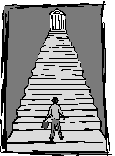
|
Page 4 |
|
Polio Update |
|
ž Women Aging with Polio Research – Another research study is underway to examine the relationships between perceptions of aging and gender, perceived ability, and age related health outcomes among women 55 to 75 who have had paralytic polio since childhood. For further information on this study, you may contact the principal researcher Tracie Harrison at the University of Texas in Austin, 512-471-9085. Results will be included in a later Polio Update.
ž Chronic Fatigue and Post-Polio - In Canada, researcher Marcia Falconer believes she has found a key piece of the puzzle in treating post-polio syndrome and the chronic pain and severe fatigue that accompany the conditions. She advocates greater understanding of the connection between polio, fibromyalgia and chronic fatigue. She is quoted as saying “Inflammation has been implicated in almost all chronic diseases, yet post polio syndrome researchers have largely ignored this research.” Further information on this on-going research will be provided in later Polio Updates as it is finalized.
ž New Book for Polio Survivors and Their Families - Margaret Backman, Ph.D., is a clinical psychologist in New York. Her recent book, The Post-Polio Experience: Psychological Insights and Coping Strategies for Polio Survivors and Their Families is now available through Barnes & Noble bookstores or through the publisher by calling 1-900-288-4677, Ext. 501. The cost is $18.95 plus shipping and tax. In her book, Dr. Backman examines polio survivors’ reactions to their earlier experiences and their current struggles. Also, there are practical guidelines for such aspects as coping, giving and receiving help, managing stress, developing a positive self-concept.
ž Increased Pain Climbing Stairs or Getting Out of Breath? –If you have been able to climb stairs, and are now experiencing new problems or pain, or get out of breath, Dr. Richard Bruno states that the problem may be that those with post-polio syndrome are doing too much with too little. In a Post Polio Forum article, Dr. Bruno says that while you need to rule out other medical problems, those with post-polio syndrome frequently have shortness of breath when climbing stairs or walking any distance. Polio survivors may be using the same amount of energy walking upstairs as a healthy 25-year old does running up those same stairs.
When climbing stairs repeatedly, your muscles burn, your ligaments complain and you develop “polio hip or knee”—inflammation and bursitis or tendonitis in your overstressed joint area. If the pain is in the joint, it could be arthritis, but if it is in the muscles or tendons /ligaments around the joint, it could be polio-related. The remaining motor neurons and weakened muscles could be overstrained. Hip pain may actually be caused by low back or butt muscles going into spasm as they try to compensate for weak leg muscles. If stairs are a necessity in your home, try to limit the number of times you use them, and/or consider adding a stair lift, ramp, or diverting entry to an area that is more level.
If severe arthritis is diagnosed as causing hip or knee pain, joint replacement can be very difficult for those with post polio syndrome. Typically, if the joint has less than antigravity strength, there may not be enough strong muscles to hold the new socket in place. The result could be worse than before the surgery. Knee joints may be even more difficult for those with PPS than hip joints. If you are considering, or have been recommended for, hip or knee joint replacement, discuss these concerns with your health professional to be sure that such surgery is the right choice for you. Many hip and knee replacement surgeries are successful, but knowing all the facts and options beforehand might prevent disappointment later.
|
